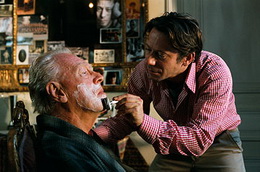
The Triumph of ‘The Diving Bell and the Butterfly’
At first, it’s a little difficult to get your bearings. The camera wanders, is never completely in focus, and the audio is muffled, cutting in and out. It pans back and forth to simulate the movement of the eyes. A narrator begins to speak. Seeing the world through the limited perspective of a bedridden man wouldn’t normally strike one as the most cinematic of ideas.Tell that to painter Julian Schnabel (“Basquiat,” “Before Night Falls”), the director of “The Diving Bell and the Butterfly,” an inventive new film that gives the audience the point-of-view of Jean-Dominique Bauby, the editor of French _Elle _magazine, who was paralyzed, save for an eyelid, following a massive stroke.His mind is functioning clearly, but he is trapped within his body. The audience discovers Bauby’s condition as he would, and the details about it become big, emotional moments rather than sidenotes. We learn (with him) that he cannot speak when he keeps repeating himself and no one is responding to him. The narration we hear is only in his head. Additionally, when the doctors decide to sew one eye up, we see it happen right in front of us as if it were our eye, until the screen goes black. This genius collaboration between director of photography Janusz Kaminski and Schnabel immerses you in Bauby’s situation so that it becomes your reality. There are flashes outside of his perspective, but Ronald Harwood, who adapted the screenplay from Bauby’s novel, strategically lets only as much information about our philandering protagonist in as his memory allows.This is based on a true story, and just as surely as the hospital staff developed a way for Bauby to communicate through blinking the letters of the alphabet, the actual man miraculously completed a novel. What sounds like a debilitating tragedy becomes a life-affirming event in Schnabel’s hands, but not like we have seen before in stories about people with disabilities. It is a heroic feat and triumph of the human spirit, yes, but Mathieu Amalric (“Munich”) invests Bauby with so many typical human flaws that he becomes more than some whitewashed symbol of courage. He becomes a real, flawed human being.Outside of his bedroom, there are flashbacks to his strained, yet tender relationship with his father (Max Von Sydow). There is great affection there, but their uncommunicative mode of communication is very real. The mother of his children (Emmanuelle Seigner) stays by his side during his experience, but his thoughts (and decisions) stray towards the beautiful young lady he was seeing before his “locked-in” syndrome took hold. This kind of unsympathetic behavior is just another step towards making Bauby more real in a partially fixed-perspective world that seems completetly unreal.
This genius collaboration between director of photography Janusz Kaminski and Schnabel immerses you in Bauby’s situation so that it becomes your reality. There are flashes outside of his perspective, but Ronald Harwood, who adapted the screenplay from Bauby’s novel, strategically lets only as much information about our philandering protagonist in as his memory allows.This is based on a true story, and just as surely as the hospital staff developed a way for Bauby to communicate through blinking the letters of the alphabet, the actual man miraculously completed a novel. What sounds like a debilitating tragedy becomes a life-affirming event in Schnabel’s hands, but not like we have seen before in stories about people with disabilities. It is a heroic feat and triumph of the human spirit, yes, but Mathieu Amalric (“Munich”) invests Bauby with so many typical human flaws that he becomes more than some whitewashed symbol of courage. He becomes a real, flawed human being.Outside of his bedroom, there are flashbacks to his strained, yet tender relationship with his father (Max Von Sydow). There is great affection there, but their uncommunicative mode of communication is very real. The mother of his children (Emmanuelle Seigner) stays by his side during his experience, but his thoughts (and decisions) stray towards the beautiful young lady he was seeing before his “locked-in” syndrome took hold. This kind of unsympathetic behavior is just another step towards making Bauby more real in a partially fixed-perspective world that seems completetly unreal. The dedicated hospital professionals have more patience than he is finally willing to test (and in a nod to aesthetics over realism, they are all quite beautiful), and his self-deprecating sense of humor is something they simply do not have. They also cannot see what we see, as his thoughts manifest themselves onscreen. Bauby’s grounded attitude towards the whole mess he’s in keeps him from waxing too poetic about the images we are seeing, which is another feather in Schnabel’s cap. “The Dining Bell and the Butterfly” is anything but a soft-focus gauzy dream with surreal, splashy colors.Amalric’s fully-rounded performance comes alive (and out of his mind) through more flashbacks, and just as his fast-paced old life seems to be coming apart, it’s back to the hospital. But his biting narration is the most unexpected and welcome aspect of Harwood’s unromantic script. I think we would all be willing to agree that what goes on in our heads is too raw for public consumption, and Bauby’s thoughts are definitely lacking the filter that they need to go through before others hear them.This movie is the perfect marriage of writer, cinematographer, and director. Kaminski’s images are achingly beautiful, Harwood’s script never ventures into overwrought territory and steers away from manipulative techniques, while Schnabel’s assured direction keeps the audience emotionally invested every step of the way. title=”capsule review before night falls title=”on-camera review of munich
The dedicated hospital professionals have more patience than he is finally willing to test (and in a nod to aesthetics over realism, they are all quite beautiful), and his self-deprecating sense of humor is something they simply do not have. They also cannot see what we see, as his thoughts manifest themselves onscreen. Bauby’s grounded attitude towards the whole mess he’s in keeps him from waxing too poetic about the images we are seeing, which is another feather in Schnabel’s cap. “The Dining Bell and the Butterfly” is anything but a soft-focus gauzy dream with surreal, splashy colors.Amalric’s fully-rounded performance comes alive (and out of his mind) through more flashbacks, and just as his fast-paced old life seems to be coming apart, it’s back to the hospital. But his biting narration is the most unexpected and welcome aspect of Harwood’s unromantic script. I think we would all be willing to agree that what goes on in our heads is too raw for public consumption, and Bauby’s thoughts are definitely lacking the filter that they need to go through before others hear them.This movie is the perfect marriage of writer, cinematographer, and director. Kaminski’s images are achingly beautiful, Harwood’s script never ventures into overwrought territory and steers away from manipulative techniques, while Schnabel’s assured direction keeps the audience emotionally invested every step of the way. title=”capsule review before night falls title=”on-camera review of munich

